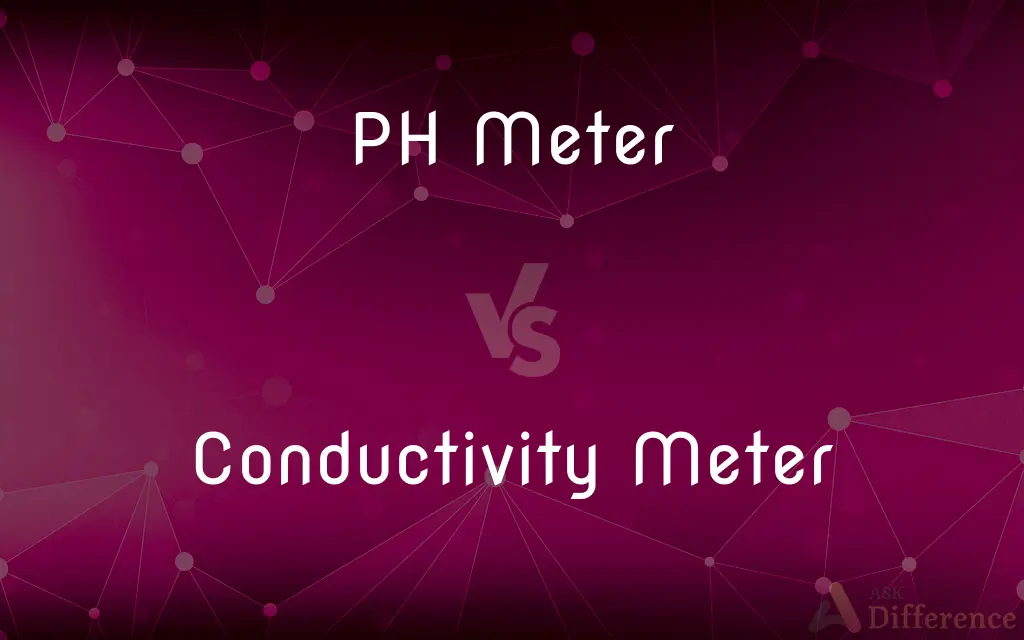PH Meter vs. Conductivity Meter — What's the Difference?
By Tayyaba Rehman — Published on November 2, 2023
A pH Meter measures the acidity/alkalinity of a solution, while a Conductivity Meter gauges its ability to conduct electrical current.

Difference Between PH Meter and Conductivity Meter
Table of Contents
ADVERTISEMENT
Key Differences
A pH Meter primarily focuses on assessing the hydrogen ion concentration in a solution, thus determining its acidity or alkalinity. On the flip side, a Conductivity Meter elucidates how well a solution can conduct an electrical current, being intertwined with the ions present in the solution.
When discussing precision, a pH Meter enables scientists and researchers to accurately gauge the exact pH level of a solution, thereby aligning protocols for diverse research and industrial applications. Conversely, a Conductivity Meter, while also precise, is pivotal for understanding the electrolyte balance and ion concentration in solutions, offering a different lens through which to view solute properties.
In application contexts, a pH Meter plays a vital role in industries like agriculture, where soil pH is paramount for crop health. The Conductivity Meter, while also useful in agriculture for understanding nutrient concentrations, is commonly employed in water treatment plants to monitor ion levels in water.
Calibration of a pH Meter typically involves using standard buffer solutions to ensure accuracy during measurements. In a parallel universe of functionality, a Conductivity Meter is calibrated using solutions with known specific conductance to ascertain exactitude in field applications.
From an operational standpoint, pH Meters necessitate careful storage with electrode immersion in a storage solution to preserve functionality. A Conductivity Meter, while also necessitating proper storage, leans towards regular recalibration and electrode maintenance to sustain measurement integrity.
ADVERTISEMENT
Comparison Chart
Measuring Principle
PH Meter evaluates hydrogen ion concentration
Conductivity Meter assesses electrical conductance.
Usage
PH Meter is used to determine acidity/alkalinity
Conductivity Meter determines ion concentration in a solution.
Calibration
PH Meter uses buffer solutions
Conductivity Meter uses known conductance solutions.
Industries
PH Meter is essential in food, brewing, etc.
Conductivity Meter is crucial in water treatment, etc.
Maintenance
PH Meter requires electrode storage in a specific solution
Conductivity Meter emphasizes regular calibration.
Compare with Definitions
PH Meter
PH Meters contribute pivotal data in various scientific and industrial domains.
In brewing, a pH Meter assists in achieving the desired taste and consistency.
Conductivity Meter
A Conductivity Meter measures a solution’s capability to conduct electric current.
The water’s purity was assessed with a Conductivity Meter.
PH Meter
A pH Meter gauges a solution’s hydrogen ion concentration.
The scientist used a pH Meter to ensure the solution was neutral.
Conductivity Meter
Conductivity Meters are calibrated using solutions with a known specific conductance.
Accurate measurements from a Conductivity Meter necessitate vigilant calibration practices.
PH Meter
PH Meters necessitate calibration with standard buffer solutions.
Regular calibration of the pH Meter ensures accurate and reliable readings.
Conductivity Meter
Conductivity Meters are employed across various fields, including environmental and industrial sectors.
The water treatment facility utilized a Conductivity Meter to monitor effluent quality.
PH Meter
PH Meters provide quantitative data on the acidity/alkalinity of solutions.
The pH Meter indicated a value of 3, suggesting a highly acidic solution.
Conductivity Meter
Conductivity Meters offer insights into water quality and solution makeup.
Conductivity Meters enable aquarists to monitor the ionic balance in aquariums.
PH Meter
PH Meters assist in aligning processes and products with regulatory standards.
The pharmaceutical industry employs pH Meters to adhere to formulation guidelines.
Conductivity Meter
Conductivity Meters infer electrolyte presence and concentration in solutions.
With a Conductivity Meter, researchers discerned elevated ion levels in the water.
Common Curiosities
How does a PH Meter work?
It works by measuring the voltage (potential difference) between two electrodes when immersed in a solution, then converting this to pH.
What is a Conductivity Meter?
A conductivity meter is a device that measures the ability of a solution to conduct electricity, indicating its ion concentration.
How does a Conductivity Meter function?
It functions by applying a voltage between two electrodes and measuring the resulting current. The conductivity is determined from the current and the geometry of the electrodes.
How is conductivity expressed?
It's often expressed in microsiemens per centimeter (µS/cm) or millisiemens per centimeter (mS/cm).
What is the pH scale range?
The pH scale typically ranges from 0 to 14, with 7 being neutral. Values below 7 are acidic, and values above 7 are alkaline or basic.
Is a calibration necessary for these meters?
Yes, regular calibration ensures accurate readings.
How often should these meters be cleaned?
Regular cleaning, especially of the electrodes, is essential for accurate readings. The frequency depends on usage.
Why is pH measurement important?
It is crucial for various applications, including water treatment, agriculture, brewing, and many laboratory tests.
What is a PH Meter?
A PH meter is an instrument used to measure the acidity or alkalinity of a solution, expressed as pH.
Can one instrument measure both pH and conductivity?
Yes, there are combination meters available that can measure both pH and conductivity.
Why might a pH meter give inaccurate readings?
Possible reasons include uncalibrated equipment, dirty electrodes, or a depleted reference solution.
Can pH meters measure the pH of solid substances?
Typically, no. But a slurry can be made by mixing the solid with water, and its pH can then be measured.
Is distilled water a good calibration standard for conductivity meters?
No, because distilled water has very low conductivity. Specific conductivity standards are used for calibration.
What factors can affect conductivity?
Temperature, ion concentration, and the type of ions present in the solution can influence conductivity.
Can these meters be used in high-temperature solutions?
It depends on the design and specifications. Some are designed to handle elevated temperatures, but always check the manufacturer's guidelines.
Share Your Discovery

Previous Comparison
Interests vs. Hobbies
Next Comparison
Rubber Wood vs. PlywoodAuthor Spotlight
Written by
Tayyaba RehmanTayyaba Rehman is a distinguished writer, currently serving as a primary contributor to askdifference.com. As a researcher in semantics and etymology, Tayyaba's passion for the complexity of languages and their distinctions has found a perfect home on the platform. Tayyaba delves into the intricacies of language, distinguishing between commonly confused words and phrases, thereby providing clarity for readers worldwide.













































